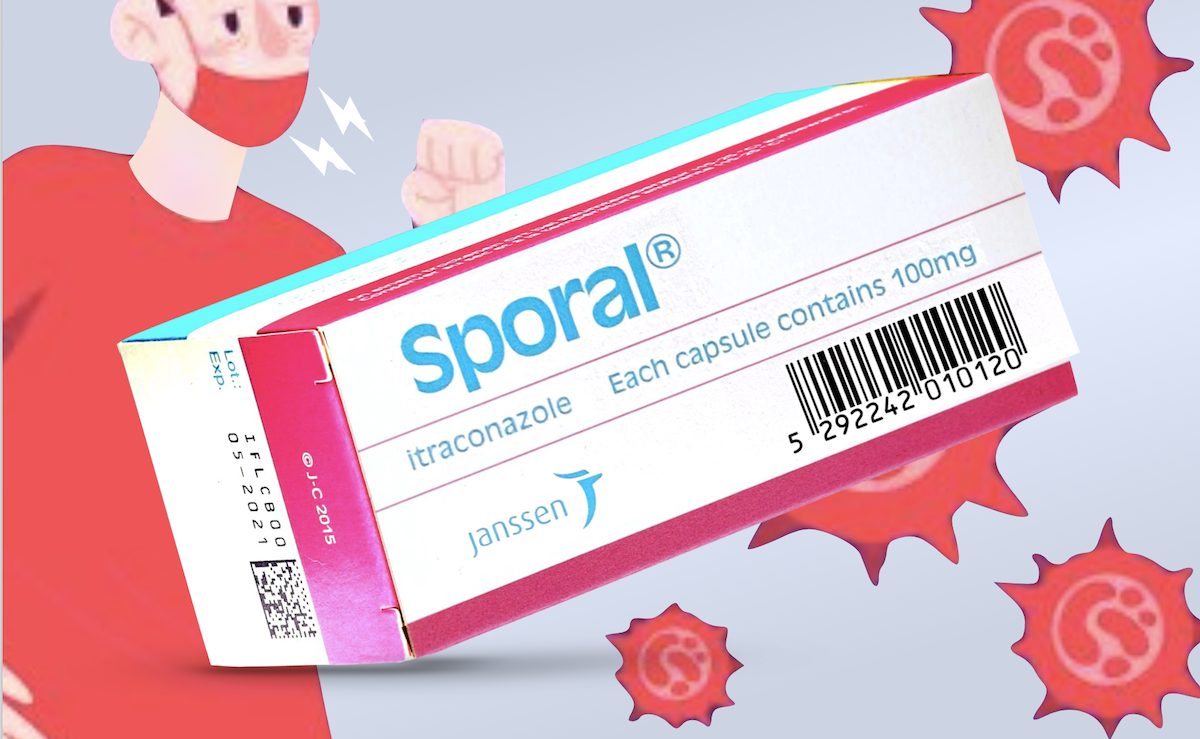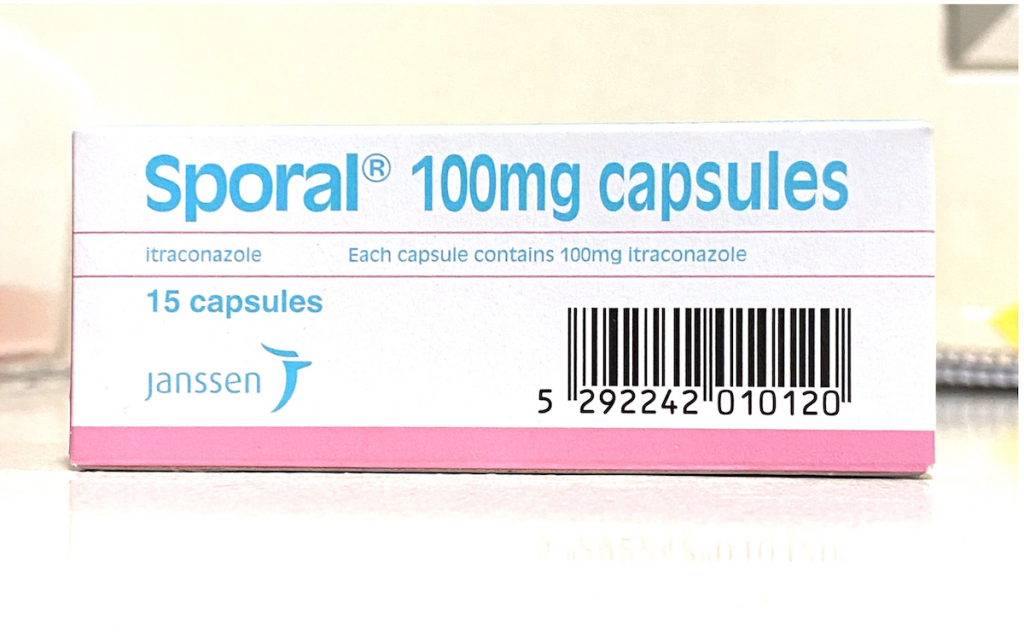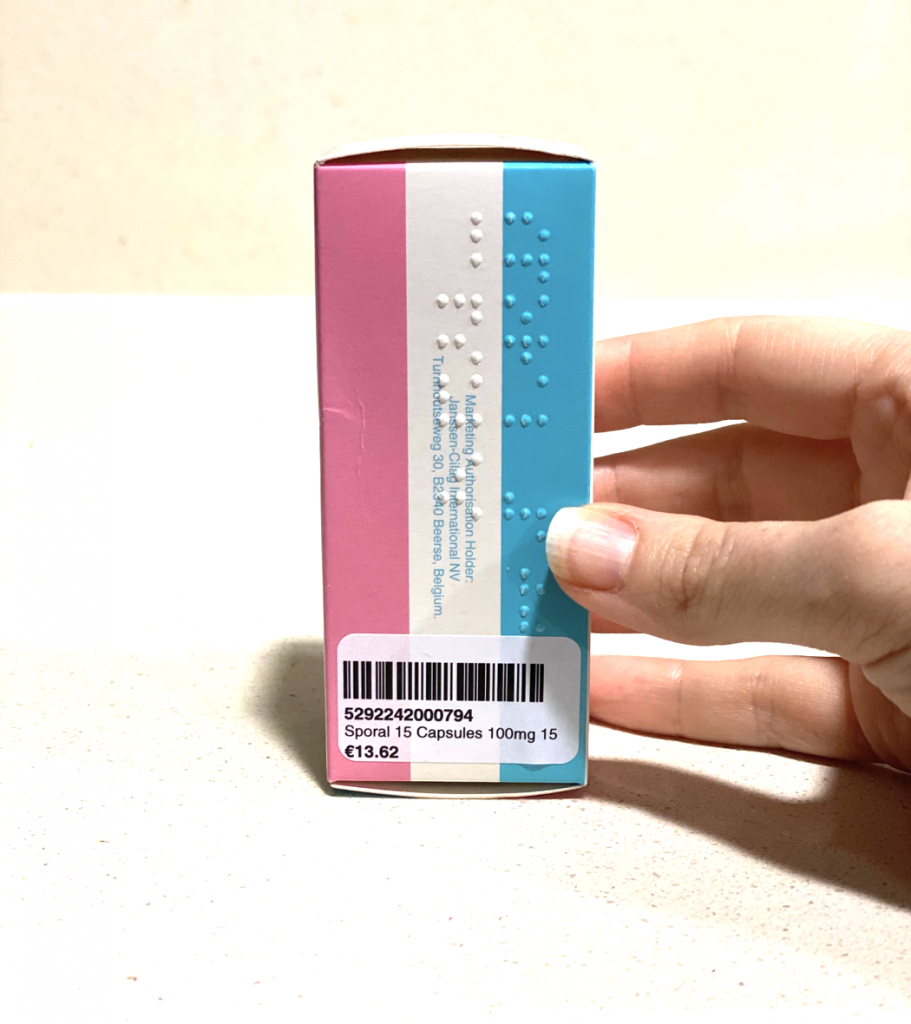Itraconazole: An Affordable Treatment for COVID-19?

I spend most of my time reading studies and textbooks on diets, ingredients, and human diseases. However, last year I was forced into a position where I had to do some extensive research into Feline Infectious Peritonitis (FIP) caused by feline coronavirus (FCoV) and stumbled across a rather unconventional, but noteworthy treatment. But why does that matter to you? To be upfront— it may, or may not matter. COVID-19 is not the same as FCoV, nor can humans get FCoV from cats. However, COVID-19 is still genetically similar to FCoV, and because there are no known viable treatment options and no vaccine for COVID-19, the precautions I’ve taken were determined by the outcomes of clinical research on FCoV.
Now I’m not a doctor or epidemiologist, but I am not alone in my thinking that treatment options for FCoV may be effective for COVID-19. Other doctors have also suggested that what works for FCoV and FIP treatment may work in humans as well.
Feline coronavirus treatment could stop spread of COVID-19 in humans, doctor says. [1]
Efficacy and safety of the nucleoside analog GS-441524 for treatment of cats with naturally occurring feline infectious peritonitis. [2]
However there’s one slight problem with GS-441524. You can’t just go out get it. And if you did, you’d have to get it on the black market and it would cost about $3,500.00. The following was published January 15, 2020:
FIP drugs continue to show promise, while being sold on black market. [3]
Then in an article published 5 days ago, it was found that the anti-malaria drug Plaquenil (Hydroxychloroquine) has also shown efficacy against Severe Acute Respiratory Syndrome Coronavirus 2 (SARS-CoV-2). However, the cost for Plaquenil is around $1,100 for a supply of 100 200 mg oral tablets. Further, you need a prescription, which doctors aren’t likely to give it to you even if you or a loved one shows symptoms of COVID-19. Of note, while CoV-2 is not the same as COVID-19, Plaquenil’s efficacy as an antiviral drug against a genetically similar human coronavirus is still worth considering.
In Vitro Antiviral Activity and Projection of Optimized Dosing Design of Hydroxychloroquine for the Treatment of Severe Acute Respiratory Syndrome Coronavirus 2 (SARS-CoV-2). [4]
However, what should be apparent is that we need something more practical, more affordable, and more readily available. Good thing there are practical, safe, and most importantly— effective treatments for FCoV/FIP.
Which brings me back to what I am doing. Now, I’m sure the pharmacists were a bit confused as to why—of all the things panicked shoppers are purchasing like toilet paper— why on earth I would be loading up with an anti-fungal medication called Itraconazole. However, I have reason to believe itraconazole could potentially be an effective treatment against COVID-19, just like the other doctors, researchers, and epidemiologists had reasons to believe in GS-441524, and Plaquenil as potential treatments for COVID-19.
Antiviral activity of itraconazole against type I feline coronavirus infection. [5]
Endocytic Pathway of Feline Coronavirus for Cell Entry: Differences in Serotype-Dependent Viral Entry Pathway [6]
MECHANISMS OF ACTION – Why Itraconazole for COVID-19
Some viruses use cholesterol when infecting host cells and in the replication process. [7] FCoV and CoV-2 are two of those viruses, and are closely associated with cholesterol throughout the viral life cycle. [8, 9]. And, effective drugs against FCoV like U18666A, GS-441524, Itraconazole, and Plaquenil for CoV-2 are all cholesterol transport inhibitors. [10, 11, 12]
However, of the four cholesterol transport inhibitor drugs, only Itraconazole isn’t sold on the black market, doesn’t require a prescription, is low cost (I paid €13.65 for 15 100mg capsules) and is available over the counter in most countries. In other words, itraconazole is an affordable, practical, relatively available, and effective cholesterol transport inhibitor.
However, for humans, itraconazole may be a bit more difficult to dose. In cats with FCoV, the effective dose 10mg/kg. And I was unable to find literature on the appropriate cat to human dose conversion.
That said, at 10mg/kg, I would personally need 540mg per day to meet the 10mg/kg dose recommendation, but the max recommended dose is 400mg per day. That said, I would not exceed 400 mg per day, and would never suggest ever exceeding recommended maximum dosages. Further, like all medications, there are contraindications for use of itraconazole and serious risks of side-effects. So proceed with caution, speak with a trusted physician and get your liver checked, and read this first:
Who should not take Itraconazole? The following conditions are contraindicated with this drug. [16]


Luckily, Itraconazole isn’t the only potential treatment option for COVID-19 that is practical, and readily available. The polysaccharides of Inonotus obliquus (Chaga) mushroom that appear to have antiviral activity against FCoV and immunomodulatory benefits, as well.
Identification of Inonotus obliquus polysaccharide with broad-spectrum antiviral activity against multi-feline viruses. [14]
This should be no surprise, as there are countless mushroom species with bioactive compounds with antiviral activity that have commercial and pharmaceutical interest and applications. [13]. However, Chaga appears to be the only one studied that has shown activity against FCoV.
My personal preparation plan for COVID-19
In light of this information, I have several boxes of itraconazole from Janssen (the brand used in the FCoV studies above), bottles of aqueous extract of chaga (which effectively prevents virus entry by acting on viral glycoproteins) [15], and chaga polysaccharide in powder form is on its way. Here’s one hell of a plug for Four Sigmatic Chaga Elixir.
I began taking an aqueous chaga solution 3x/day, as well as other mushroom polysaccharides immediately (reishi, turkey tail, lion’s mane) 3x/day because they have low toxicity, exert potent antiviral activity, are immunomodulatory, and simply because itraconazole can be hepatotoxic and my preference is to avoid the use of itraconazole altogether if possible. However, in the event of an emergency, I would not hesitate to use it.
That’s my plan, and I wanted to share it with you. Again, I’m not a doctor, but I hope you find this info insightful, anyway.
Stay safe, everyone.
Sincerely,
Karen
Karen Pendergrass
Paleo Foundation | Standards Team
References:
1. Giovinco, J. 2020, February 15. Feline coronavirus treatment could stop spread of COVID-19 in humans, doctor says. Fox 13 News Tampa Bay, Florida. Accessed March 14, 2020. https://www.fox13news.com/news/feline-coronavirus-treatment-could-stop-spread-of-covid-19-in-humans-doctor-says
2. Pedersen, N. C., Perron, M., Bannasch, M., Montgomery, E., Murakami, E., Liepnieks, M., & Liu, H. (2019). Efficacy and safety of the nucleoside analog GS-441524 for treatment of cats with naturally occurring feline infectious peritonitis. Journal of Feline Medicine and Surgery, 1098612X1982570. doi:10.1177/1098612×19825701
3. Burns, K. 2020, January 02. FIP drugs continue to show promise, while being sold on black market. Journal of the American Veterinary Medical Association (JAVMA) News. Accessed March 14, 2020. https://www.avma.org/javma-news/2020-01-15/fip-drugs-continue-show-promise-while-being-sold-black-market
4. Yao, X., Ye, F., Zhang, M., Cui, C., Huang, B., Niu, P., … Liu, D. (2020). In Vitro Antiviral Activity and Projection of Optimized Dosing Design of Hydroxychloroquine for the Treatment of Severe Acute Respiratory Syndrome Coronavirus 2 (SARS-CoV-2). Clinical Infectious Diseases. doi:10.1093/cid/ciaa237
5. Takano, T., Akiyama, M., Doki, T., & Hohdatsu, T. (2019). Antiviral activity of itraconazole against type I feline coronavirus infection. Veterinary Research, 50(1). doi:10.1186/s13567-019-0625-3
6. Takano, T., Wakayama, Y., & Doki, T. (2019). Endocytic Pathway of Feline Coronavirus for Cell Entry: Differences in Serotype-Dependent Viral Entry Pathway. Pathogens, 8(4), 300. doi:10.3390/pathogens8040300
7. Waheed, A. A., & Freed, E. O. (2010). The Role of Lipids in Retrovirus Replication. Viruses, 2(5), 1146–1180. doi:10.3390/v2051146
8. Takano, T., Satomi, Y., Oyama, Y., Doki, T., & Hohdatsu, T. (2015). Differential effect of cholesterol on type I and II feline coronavirus infection. Archives of Virology, 161(1), 125–133. doi:10.1007/s00705-015-2655-0
9. Wang, H., Yang, P., Liu, K., Guo, F., Zhang, Y., Zhang, G., & Jiang, C. (2008). SARS coronavirus entry into host cells through a novel clathrin- and caveolae-independent endocytic pathway. Cell Research, 18(2), 290–301. doi:10.1038/cr.2008.15
10. Trinh, M. N., Lu, F., Li, X., Das, A., Liang, Q., De Brabander, J. K., … Goldstein, J. L. (2016). Triazoles inhibit cholesterol export from lysosomes by binding to NPC1. Proceedings of the National Academy of Sciences, 114(1), 89–94. doi:10.1073/pnas.1619571114
11. Takano, T., Endoh, M., Fukatsu, H., Sakurada, H., Doki, T., & Hohdatsu, T. (2017). The cholesterol transport inhibitor U18666A inhibits type I feline coronavirus infection. Antiviral Research, 145, 96–102. doi:10.1016/j.antiviral.2017.07.022
12. Pagler, T. A., Neuhofer, A., Laggner, H., Strobl, W., & Stangl, H. (2007). Cholesterol efflux via HDL resecretion occurs when cholesterol transport out of the lysosome is impaired. Journal of Lipid Research, 48(10), 2141–2150. doi:10.1194/jlr.m700056-jlr200
13. Teplyakova, Tamara & Psurtseva, Nadezhda & Kosogova, Tatiana & Mazurkova, Natalia & Khanin, Viacheslav & Vlasenko, Vyacheslav. (2012). Antiviral Activity of Polyporoid Mushrooms (Higher Basidiomycetes) from Altai Mountains (Russia). International journal of medicinal mushrooms. 14. 37-45. 10.1615/IntJMedMushr.v14.i1.40.
14. Tian, J., Hu, X., Liu, D., Wu, H., & Qu, L. (2017). Identification of Inonotus obliquus polysaccharide with broad-spectrum antiviral activity against multi-feline viruses. International Journal of Biological Macromolecules, 95, 160–167. doi:10.1016/j.ijbiomac.2016.11.054
15. Pan, Hong-Hui & Yu, Xiong-Tao & li, Ting & Wu, Hong-Ling & Jiao, Chun-Wei & Cai, Mian-Hua & Li, Xiang-Min & Xie, Yi-Zhen & Wang, Yi & Peng, Tao. (2013). Aqueous Extract from a Chaga Medicinal Mushroom, Inonotus obliquus (Higher Basidiomyetes), Prevents Herpes Simplex Virus Entry Through Inhibition of Viral-Induced Membrane Fusion. International journal of medicinal mushrooms. 15. 29-38. 10.1615/IntJMedMushr.v15.i1.40.
16. Who should not take Itraconazole? WebMd. Accessed March 14, 2020. https://www.webmd.com/drugs/2/drug-128-2179/itraconazole-oral/itraconazole-oral/details/list-contraindications
